
smell fuel? don't turn on your indicators!
ned - 8/6/06 at 08:35 AM
A work colleague had the misfortune to lose his pride and joy due to bad plumbing in of a swirl pot (not by him).
He smelt fuel and whilst pulling over the vapour ignited from the indicator being turned on - apparantly the most common cause of car fires according
to the fire service.
Thankfully he got out unhurt (even though he was still moving when the fireball went through the interior) and the car was insured agreed value and
the company who did the work on the swirl pot have agreed to pay anything else no covered.
I don't know the spec but it was making about 400bhp.
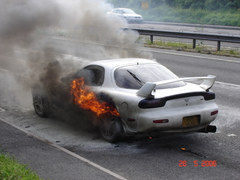

Rescued attachment DSC00417.jpg
ned - 8/6/06 at 08:35 AM
another
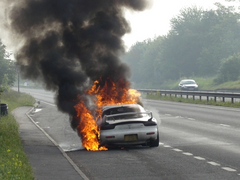

Rescued attachment Rotorstock2006012.jpg
ned - 8/6/06 at 08:36 AM
another
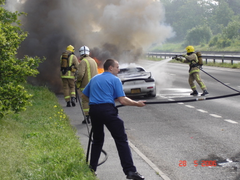

Rescued attachment DSC00418.jpg
ned - 8/6/06 at 08:37 AM
another
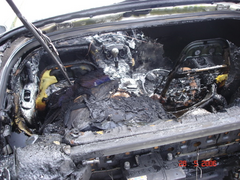

Rescued attachment DSC00420.jpg
ned - 8/6/06 at 08:37 AM
another
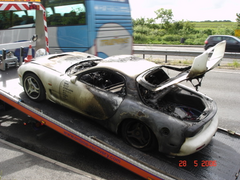

Rescued attachment DSC00421.jpg
mookaloid - 8/6/06 at 09:02 AM
Eeeek glad he got out alright...
omega0684 - 8/6/06 at 09:15 AM
what a shame, that is a god damn nice car too! glad to hear that he is ok tho, is he going to sue the company that installed the swirl pot, i would!
DaveFJ - 8/6/06 at 09:18 AM
fire seems to be at the back.. can anyone say 'Donor' ? 
seriously though - sad to see but good that the guy is OK.
ned - 8/6/06 at 09:21 AM
i gather he's buying the car back for the engine and other salvagable bits...
Ned.
James - 8/6/06 at 10:47 AM
quote:
Originally posted by ned
i gather he's buying the car back for the engine and other salvagable bits...
Ned.
Tell him to be bloody careful with it if he does.
I have a couple of friends in the Fire Service, various plastics/rubbers are absoloutely deadly once burnt.
All sorts of nasty, noxious chemicals are given off.
Glad he's ok.
James
David Jenkins - 8/6/06 at 10:51 AM
Correct - the main risk is Fluoric Acid (see this safety sheet ) that is released when
some rubber materials are burnt.
Most chemists hate having to deal with the stuff.
David
[Edited on 8/6/06 by David Jenkins]
iank - 8/6/06 at 10:57 AM
quote:
Originally posted by James
quote:
Originally posted by ned
i gather he's buying the car back for the engine and other salvagable bits...
Ned.
Tell him to be bloody careful with it if he does.
I have a couple of friends in the Fire Service, various plastics/rubbers are absoloutely deadly once burnt.
All sorts of nasty, noxious chemicals are given off.
Glad he's ok.
James
Seconded, look up Hydrofluoric Acid for one of them.
http://en.wikipedia.org/wiki/Hydrofluoric_acid
I didn't think you could even buy cars written off by fire (catagory F) due to the safety problems.
NS Dev - 8/6/06 at 12:29 PM
wear rubber gloves, don't get it on your skin, no probs.
We use it for picking welds and etching various things including glass, rubber gloves keep it off you no probs.
Just have to remember it's not water soluble so it dont wash off very well!
iank - 8/6/06 at 12:43 PM
quote:
Originally posted by NS Dev
wear rubber gloves, don't get it on your skin, no probs.
We use it for picking welds and etching various things including glass, rubber gloves keep it off you no probs.
Just have to remember it's not water soluble so it dont wash off very well!
You sure you are talking about the same stuff? From wikipedia "Hydrofluoric acid is a highly corrosive solution of hydrogen fluoride in
water."
You don't get to wash it off, if it gets on the skin even in tiny quantities it's absorbed through the skin and starts eating away at the
tissues inside.
Very very nasty stuff that can and will kill you if you aren't very careful.
Confused but excited. - 8/6/06 at 07:08 PM
quote:
Originally posted by NS Dev
wear rubber gloves, don't get it on your skin, no probs.
We use it for picking welds and etching various things including glass, rubber gloves keep it off you no probs.
Just have to remember it's not water soluble so it dont wash off very well!
Hydroflouric acid IS water soluble. It is an anhydrous (dry) gas disolved in water. I used to work at the ICI plant that made the bloody awful stuff.
The worst crap I ever worked with.
The instructions we received in the event of skin contact, were;hold under a running tap for 15mins and then plaster the area affected with a special
cream ( kept in emergency cabinets around the plant ) whilst RUNNING to the medical centre. Then kick the door open and shout "HF" at the
top of your voice. This would ensure that regardless of anyone else being treated you got priority.
Treatment consisted of about thirteen injections around every splashmark to ensure that the meat was thoroughly saturated with nutralising agent.
If it penetrates to the bone, it has to be amputated. Every one wore hard hats!
Rubber gloves offer no protection whatsoever from Hydroflouric acid. You have to use the green ( double dipped ) pvc gauntlets.
I have worked with chlorine, bromine, HcL, Sulphuric, all sorts of noxious crap, but they are like eau de cologne compared to this sh1t!
IT IS EVIL!
When working on a leak, and I mean even a tiny one, we had to wear a full environment suit and spend serious time under an emergency deluge shower
before we were allowed to take it off.
Sorry if this scares anyone.
IT'S SUPPOSED TO!
If you really want scaring, find out what happens to your bones if it reaches them!
[Edited on 8/6/06 by Confused but excited.]
NS Dev - 9/6/06 at 08:21 AM
believe me I know the problems with HF acid, we do have a health and safety training dept!
Just saying that it's not some magical chemical, its used daily in industry, safely, as long as precautions are taken!
Here's a pic of the HC + HF acid paste used for stainless weld pickling:

flak monkey - 9/6/06 at 08:46 AM
What people dont realise is that COSHH sheets are usually written for the neat chemical. Those ones above certainly have been.
Most acids, if you look up the properties of the undiluted acid, are pretty severe in their effect on the human body.
Most diluted acids (5mol or less) are much less viscious, but precautions still have to be taken.
David
DaveFJ - 9/6/06 at 08:50 AM
COSHH sheets are great... err....hmmmm
the COSHH sheet for water states "Actions on ingestion - give plenty of water to drink"




got watch out for that water stuff - nasty! stick to beer instead 
NS Dev - 9/6/06 at 09:49 AM
in some circumstances even the reverse applies.
We receive deliveries of 96% sulphuric acid by the tankerload for pickling hot rolled tubing.
At 96% its actually fairly safe stuff. We dilute it down to 25% to use and it is then a very major hazard!!! Certainly the steel storage tank will
happily contain 96% acid, but the dilute stuff will rot clean through it in minutes!!














